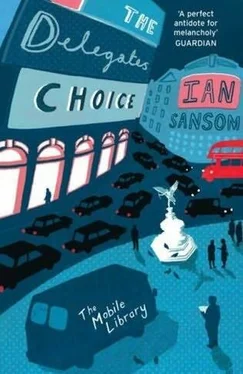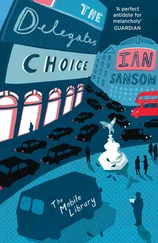'Aye,' said Ted.
'More baklava, Ted?'
'Maybe just a small piece.'
Israel went to take a piece as his mother offered the plate to Ted.
'Guests first,' she said, slapping Israel's hand. 'I do like to see a man with a healthy appetite.'
'I have a healthy appetite, Eva,' said Ted, 'that I must admit.'
Israel thought he might be sick.
'Have you ever met Gloria, Ted?' said Israel's mother.
'Who?'
'Israel's girlfriend. She was meant to be here this evening. Still no sign, Israel?'
'No,' said Israel.
'They live-lived?'
'Live,' insisted Israel.
'Together.'
'No, I've not met her,' said Ted.
'Thin as a rake,' said Israel's mother. She held up her little finger. 'Like that. Thin. As. A. Rake. She's a high-flyer,' she said to Ted.
'I thought you'd given up smoking,' said Israel, changing the subject.
'I have,' said his mother. 'But I just have one or two occasionally, for the sake of my health.'
'For the sake of your health?'
'My mental health. Goodness, I'm sorry. He's a terrible nag, Ted, isn't he? I hope he's not like that with you?'
'We have a healthy working relationship,' said Ted.
'Well, anyway. If Mr Health Police here would excuse us, perhaps, Ted, you would like to join me for a cigarette on the terrace.'
'We don't have a terrace, Mum.'
'The patio, then,' said Israel's mother, getting up from her seat. 'You are so pernickety. And perhaps Gloria will have arrived before we're all through?'
Ted got up obediently and to the strains of 'Moondance' followed Israel's mother into the kitchen and out into the back garden.
* * *
Israel looked again at the photos on the walls. Checked his mobile again; nothing from Gloria.
He couldn't believe she'd missed the meal.
He was desperate to see her.
Gloria: she looked like Giuletta Masina as Gelsomina in Fellini's La Strada -a film they'd gone to see together at the National Film Theatre, years ago. They used to go to the cinema two, three times a week back then.
In fact, Gloria looked nothing like Giuletta Masina as Gelsomina in Fellini's La Strada. Sometimes he could barely remember what she looked like. She was definitely beautiful though. She was…What could he say? She was just…Gloria.
When Israel's mother and Ted returned, laughing and smelling of cigarettes, Israel was picking miserably at the remains of the baklava.
'He was a terribly greedy child,' said his mother.
'Mother!'
'You were, though. Chocolate biscuits. He was a fiend for the chocolate biscuits, Ted. Honestly. I had to hide them. And then the girls would beat him up. He never learned to stick up for himself.' She walked over towards the hi-fi system. 'No sign of Gloria then?'
'No, she-'
'Has stood you up, I think.'
'No,' said Israel. 'She has not stood me up, she's just…'
'And not for the first time,' said Israel's mother.
'She-'
Israel's mother simply waved her hand at Israel dismissively and knelt down in front of the record cabinet.
'A change of mood, I think,' she said. 'It turns out Ted and I have an interest in common, Israel.'
'What, winding me up?' said Israel.
'Now, how many times do I have to tell you? Don't be rude to our guest, please.'
'What then?' said Israel. 'What interest have you got in common?'
'Line dancing,' said Israel's mother.
'Ha!' said Israel. 'Good one. You don't go line dancing.'
'I do now.'
'Since when?'
'Since you've been gone. I do have a life, you know.'
'Yes, of course, but-'
'What?' said Israel's mother.
'Line dancing?' said Israel, as though she'd confessed to participating in some kind of Satanic abuse rituals.
'What's wrong with line dancing?' said Israel's mother, her back to him, searching for records.
'Well, there's nothing wrong with line dancing. But couldn't you have done…I don't know, tango, or something?'
'In Finchley, dear? Don't be such a snob. You're like your father. He wouldn't go to discos or anything when we were young. And also it's very good exercise. Keeps me in shape.' She patted her hips.
'Ted?' said Israel. 'You don't dance, do you?'
'Aye,' said Ted. 'I do.'
'Really?'
'Best feet in the parish,' said Ted. 'First Friday of every month in the First and Last.'
'He never really joined in with anything, you know,' said Israel's mother.
'Mother! I am here, you know. I can hear you.'
'Yes. Ah! Just what I'm after.' She stood up, record in hand. 'We're fine here, you know, if you want to leave us.'
'Well, it has been a long day,' said Israel. 'But I'm sure Ted is tired as well. Shall I show you where you're sleeping, Ted?'
'Oh, leave Ted with me, Israel, he'll be fine,' said his mother.
'Are you sure, Ted?'
'Aye,' said Ted. 'We're grand.'
'That's it, you pop along and read your books there.'
'Mother, I'm not a child.'
'Of course not! Good night then!'
So Israel left them to it.
He went upstairs to his childhood bedroom, the room where he'd done all that groundwork on Verfremdung and ostranenie in his teens. It had been decorated several times since then, and with the chintz it just wasn't the same; you couldn't really feel properly alienated under a nylon sunflower-print duvet cover.
His first night back in England and he was alone.
Except for the dog: his mother had put Muhammad in with him; he sat whimpering in his travel basket.
'Shut up!' said Israel. Muhammad continued to whimper. 'No, really. I'm not joking.' Whimper. Whimper. 'Shut up!'
Sometimes in Tumdrum Israel had had dreams about this room, but in his dreams it was much larger, a palace, where he would weigh his conscience and enjoy his princely pleasures. But of course it wasn't a palace; it was a room furnished with cheap melamine furniture and miniature Monet prints in lilac-coloured pine frames. Israel could no longer even imagine his excitement at reading Portnoy's Complaint in here, let alone re-create in memory that wet afternoon when Gloria had first let him kiss her here. It was all gone. All his books were gone. Everything of his own was in the flat he shared with Gloria.
He rang her number again. Ten thirty: it wasn't late.
No reply.
He texted.
No reply.
Downstairs he could hear the sound of his mother's records. They'd never upgraded to a CD player. He remembered his father swivelling the records between his fingers, blowing gently on them, as if they were votive candles. And he could hear his mother singing, 'Don't tell my heart' and Ted singing back, 'My achy breaky heart' and both of them duetting on 'I just don't think it'd understand.'
And he crawled, exhausted, alone, unhappily, into bed.
Muhammad was snoring in the corner.
For a long time he couldn't get to sleep. First it was Ted and his mother downstairs: 'It's a marvelous night for a moondance.' Oh God. Then it was the dog. Then it was dreams. Bad dreams about Gloria.
He was awake at one, and then half past one, and two o'clock, half past two. Eventually, he sat up in bed and tried to remember what his room had looked like before his mother's recent thoroughgoing chintz makeover. He tried to picture the whole pre-chintz thing, his thing, the posters-Nelson Mandela and U2, the Pogues and Woody Allen-and the bookshelf, the wardrobe, the desk, right down to the position of the books on the shelves. He imagined himself as a hostage or a prisoner, held against his will in a one-piece nylon sunflower-print duvet cover, in a tiny chintz cell, with a small snoring Jack Russell, having to reconstruct his life from scraps and memories, and he found to his surprise that if he shut his eyes very tight he could do it; he was Brian Keenan, with John McCarthy, and he could see every peeling scrap of wallpaper and every book: The Alexandria Quartet in their horrid puke-murky covers, and a big fat swollen jumble-sale Norman Mailer, The Naked and the Dead, and A Clockwork Orange from the Oxfam shop in Mill Hill, and Jack Kerouac, and William Burroughs, and Allen Ginsberg. And seeing them, picturing them, he immediately regretted almost every one of them, regretted having spent any time on them at all: they seemed suddenly bogus, pointless, a pose.
Читать дальше
Конец ознакомительного отрывка
Купить книгу












